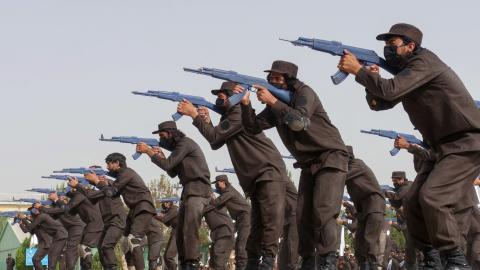Last month, Afghanistan was hit by yet another major natural disaster. There was significant flooding in the northern provinces of Badakhshan, Baghlan, and Takhar. Estimates vary but it is thought that hundreds of people died and thousands were displaced from their homes.
This latest catastrophe comes on the heels of a series of earthquakes in western parts of the country late last year that left at least 2,000 people dead and 150,000 in dire need of humanitarian aid.
The effects of these disasters on Afghans are particularly bad because of the lack of good governance and economic development in the country. Since the Taliban took back power in August 2021, Afghanistan has been on a downward spiral. Basic medical supplies are in short supply. Millions of people are affected by food insecurity. The Taliban, who proved to be very effective as insurgents, have been unable to govern effectively since regaining power.
This terrible humanitarian situation is worsened by another issue: the Taliban’s inability to earn formal diplomatic recognition from the international community. Not one country has formally recognized the Taliban as the legitimate government of Afghanistan so far. The effect of this, in part, is that the economic investment and international aid that would otherwise be available to the country simply does not exist. These are things the Afghan people desperately need.
While many countries have indirect or de facto engagement with the Taliban, all stop short of formal recognition. This is because the Taliban have done nothing to reassure the international community that they have changed their ways from their rule during the 1990s.
Many of the promises they made in the lead-up to their takeover in 2021 have not been honored. Girls are still not allowed to attend school. Terrorist groups such as Al-Qaeda freely roam the country. Women have been removed from the workplace.
Further complicating matters, splits within the top ranks of the Taliban movement mean the international community is not sure with whom it should engage. All these factors make formal recognition of the Taliban difficult, if not impossible.
Where there has been international engagement with the Taliban, it is usually for pragmatic reasons of national self-interest. For example, northern neighbors in Central Asia engage with Kabul purely for economic and security reasons. Kazakhstan recently signed trade deals with the Taliban worth about $200 million and lifted travel bans placed on senior Taliban officials.
Meanwhile, Turkmenistan and Uzbekistan’s engagements with the Taliban are driven by border security and counterterrorism concerns.
Surprisingly, Iran is probably the country in the region that has the best relationship with the Taliban. This unorthodox mix of Shiite and Sunni sectarian extremism is driven purely by national self-interest and geopolitics. One of the main drivers of Tehran’s relations with the Taliban is access to water from the Helmand River, which originates in Afghanistan but flows into Iran. Regional dynamics between Iran and its Sunni
Arab neighbors have led Tehran to believe its best counterbalance is engagement with the Sunni Taliban.
Furthermore, and in a twist of geopolitical irony, the Taliban and Pakistan are now at odds after years of cooperation, and border skirmishes occur from time to time. With relations between Tehran and Islamabad also experiencing difficulties, the unusual Iranian-Taliban relationship is not so surprising.
Other powers on the Eurasian landmass, such as China and Russia, have chosen to engage with the Taliban for geopolitical reasons, too. From the perspective of Moscow and Beijing, the fact that the Taliban defeated the West in Afghanistan is enough of a reason to maintain cordial relations with Kabul.
Furthermore, Russia naively sees the Taliban as a possible bulwark against Daesh, while China views Taliban-controlled Afghanistan as a potential source of mineral resources.
The Taliban have also been frozen out of regional and international organizations. Regional blocs such as the Shanghai Cooperation Organization and the South Asian Association for Regional Cooperation, all of which pre-Taliban Afghanistan participated in, have excluded the country. The same is true of international organizations such as the UN and the World Health Organization. In fact, the UN has a number of Taliban leaders still under international sanctions.
If the Taliban are having problems with international recognition, they are not the only ones in Afghanistan. Major anti-Taliban groups also come up short when it comes to persuading the international community to recognize them.
The most prominent and largest organization of this kind, the National Resistance Force of Afghanistan, has had no formal engagement from any country other than Tajikistan, and even that takes place quietly and carefully.
Even though many countries will, as noted, indirectly deal with the Taliban there is no such equivalent engagement with the NRF. If countries such as the US and others can engage with the Taliban indirectly, there should be no reason why they cannot do the same with opposition groups such as the NRF.
Until the Taliban starts governing responsibly in Afghanistan, while also demonstrating to the international community that it can be a trusted partner, few countries, if any, will establish diplomatic relations.
And for as long as the Taliban remain international pariahs, the Afghan people will continue to suffer as a result of the lack of economic investment in the country and the mere trickle of international humanitarian aid that can be provided.
The fastest way for the suffering of the Afghan people to end is for the Taliban to live up to their promises, reject terrorism, protect the rights of women and minorities, and form an inclusive government that represents the interests of all Afghans.
Sadly, the Taliban have shown no desire to change their ways and, once again, the Afghan people are the ones who suffer.



















